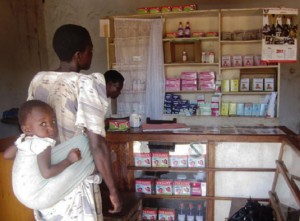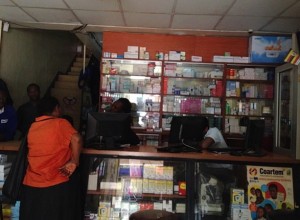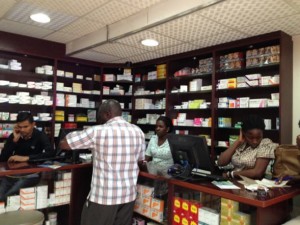
Source PSP: Drug Shop. Kampala, Uganda.
The public sector, as the biggest player in delivery of malaria services, continues to lack the capacity to address all the needs of the number one killer disease of both children and adults in Uganda. An estimated 110,000 malaria related deaths are reported annually affecting mostly children and pregnant women. The sector’s challenges are also reflected in the suboptimal community response to fevers, whereby nearly half of caretakers and adult patients opt for self-medication, with only a quarter of caretakers seeking treatment at a health facility. This is further compounded by poor access to malaria diagnosis, which still remains poor in Uganda; over 80% of malaria treatments are applied without parasitological testing. As a result, presumptive treatment is very common and treatment decisions are often irrational; emphasizing the need to use of RDTs prior to treatment to improve cost-effectiveness especially when prescribing the preferred efficacious and expensive malaria ACTs.

Private wholesaler in Kampala, Uganda.
Before the institution of the Affordable Medicines Facility-malaria (AMFm), the role of the private sector was not well emphasized and promoted. This was big oversight; given 50% of all malaria treatments distributed to patients in Uganda are accessed through drug shops and clinics, especially amongst lower income groups.
JLM Pharmaceuticals Ltd, a for-profit start-up company, being aware of the urgent gap to increase access to malaria diagnostic and treatment, launched a concerted effort to gain better understanding of the current need that can be filled through the private sector. JLM has partnered with Zagaya and WDI institute at the University of Michigan to conceptualize a delivery system for a single bundled malaria product targeting the private sector, through private wholesalers, and drug shops at community level. The bundled product would contain both an RDT together with ACT malaria treatment. We have a lot of optimism for the impact this product will have on malaria service delivery in Uganda, especially incentivizing use of malaria RDTs to inform treatment decisions which will improve patient’s outcomes; improve tracking of product consumption to address issues of drug wastage, and improve access to affordable and quality medicines.

Private wholesaler in Kampala, Uganda.
JLM is working on delivery model that will utilize micro financing and business management training under a franchise to build sustainability at service outlets level, and for the overall supply chain. The survey findings reported that supplies were purchased on credit by all private wholesalers, and majority of drug shops and clinics which also gave debt for drugs and diagnostics to a sizeable number of patients. This resulted in small profit margins for these businesses, greatly affecting the viability, and continuity of these small businesses. It is a very interesting and very optimistic season for us to be able to reach and plug a gap that will impact the livelihood of people suffering from malaria and their affected families. We are optimistic that the multiplex of delivery options highlighted above will in the long term converge into a concrete and rewarding contribution towards elimination of malaria.
Agnes Nabasirye is CEO of JLM Pharmaceuticals Ltd.
Leave a Reply
You must be logged in to post a comment.